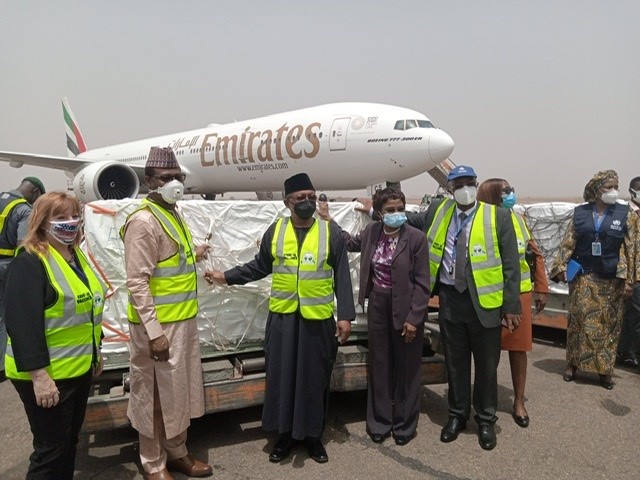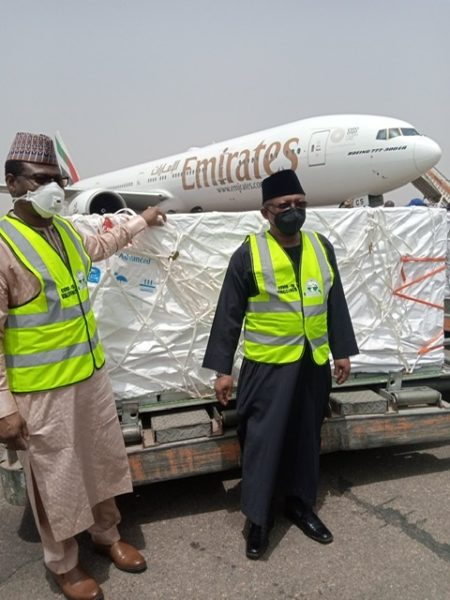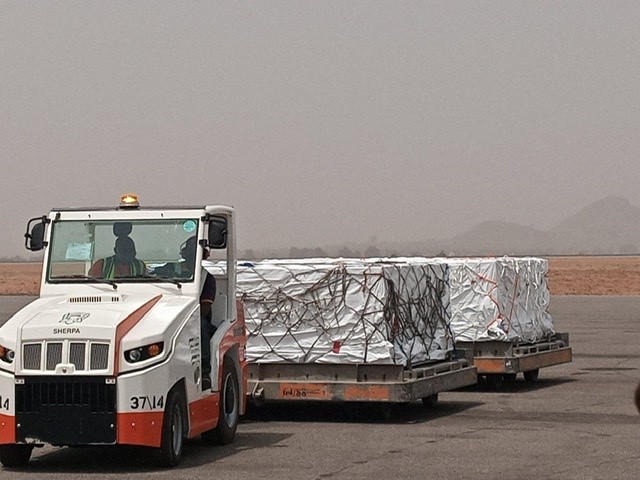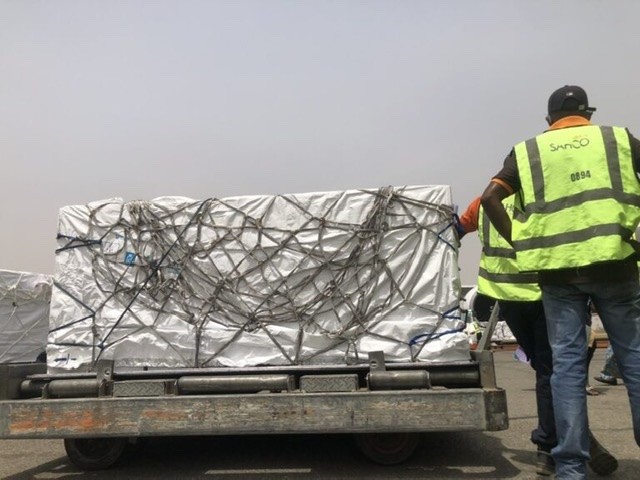Nigeria joins South Africa and Ghana which were the first two countries to receive the vaccines in Africa.
The NAFDAC-approved AstraZeneca vaccines arrived in an Emirates airline (Boeing 777 aircraft) at the Nnamdi Azikiwe International Airport, Abuja.
Advertisement
The country received 3.94 million doses of the vaccines about 11 hours before the expected time of delivery.
The Federal Government had on Saturday announced that the country was due to receive about 4 million doses of the vaccine at about 10 pm on Tuesday.
The dispatch is part of an overall 16 million doses planned to be delivered to Nigeria over the next few months via the COVAX facility.
The government said the vaccines would be administered first to front line health care workers who provide essential care to “severe COVID-19” patients.
Advertisement
Speaking at the event, televised by Arise Television and monitored by THE WHISTLER, the Chairman of the Presidential Taskforce on COVID-19, Boss Mustapha, expressed delight over the opportunity to receive the nation’s first batch of vaccine.
He said, “I take this opportunity on the behalf of the president, to take delivery of 3.92 million of the Oxford-AstraZeneca vaccines which are part of the supplies we are receiving from the COVAX facility from Mumbai, India which arrived this morning.
“I want to take this opportunity to express gratitude for the government and people of Nigeria, to the coordinating efforts of the WHO (World Health organisation), GAVI, CEPI who facilitated the procurement and the delivery of this quantity of vaccines as a symbolic gesture of our responsibility as a presidential task force”.
Mustapha, who is also the Secretary to the Government of the Federation, handed over the vaccines to the Ministry of Health, which according to him, has the sole responsibility of ensuring that the due processes were followed in the distribution process.
Receiving the vaccines, the Minister of Health, Osagie Ehanire said he was excited over the final arrival of the long-awaited vaccine into the country.
Advertisement
“This is the beginning of our journey towards eliminating COVID-19 from our country. We assure you that the due process will be done. It will be of equitable use and also free distribution and application to all parts of the country, according to the protocols that have been worked out, following the guidelines of the WHO.
“This consignment will first be examined by NAFDAC (National Agency for Food and Drugs Administration and Control) and after that, it would be handed over to the Executive Director, National Primary Health Care Development Agency (NPHCDA), whose duty is to ensure that it goes to all zones, to the states for application”.
A NAFDAC representative, who represented the agency’s Director-General, Mojisola Adeyeye, said following its earlier approval of the vaccine, the agency will collect samples for further examination.
He noted that the sample will be examined to determine the quality, safety and efficacy of the vaccine before a formal pronouncement will be made in “one or two days” to Nigerians.
The vaccine was finally handed over to the NPHCDA conditionally.
The minister had earlier said “no private hospital or the organization has experience with handling this type of vaccine and certainly no experience in vaccine application that NPHCDA has, hence the introduction of the electronic management of immunization data is critical to addressing challenges with integrity and quality data and ultimately, primary health care data”.
Advertisement
Recall also that following the approval of AstraZeneca on February 18 by NAFDAC, its evaluation had proven its efficacy to fight against the UK variant of the virus which had been reported in Nigeria.
The World Health Organisation (WHO) had recently approved AstraZeneca vaccine for emergency use to curtail the spread of COVID-19.
Nigeria plans to inoculate 40% of its population this year and 30% more in 2022. The country expects to receive vaccine donations that will cover one-fifth of its population and then procure an additional 50% of its requirement to achieve herd immunity.






